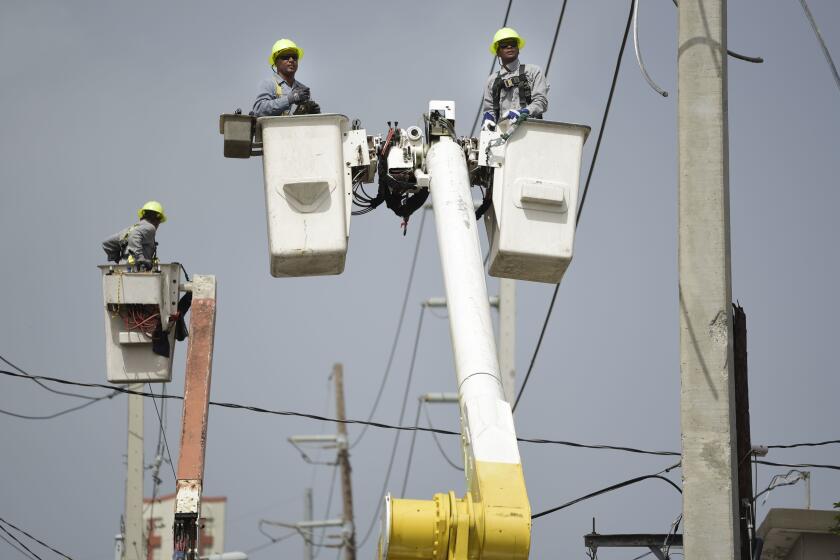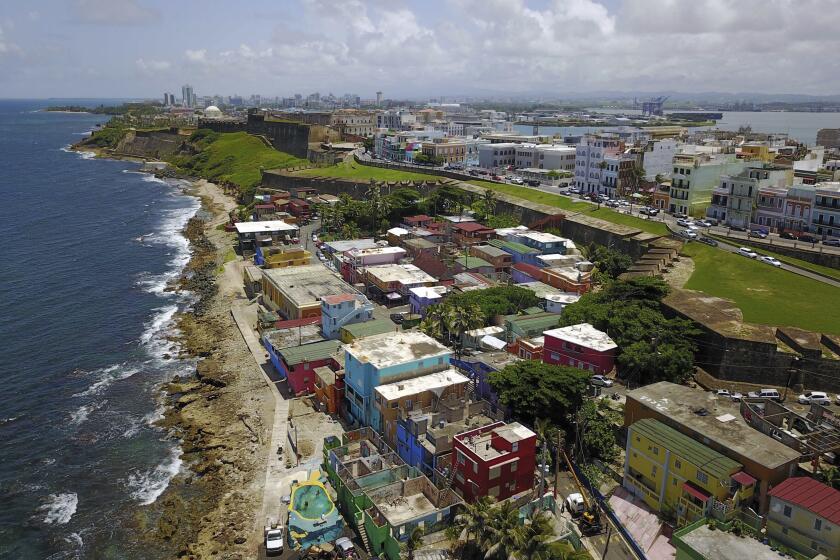Nearly all of Puerto Rico is without power on New Year’s Eve

- Share via
SAN JUAN, Puerto Rico — A blackout hit nearly all of Puerto Rico early Tuesday as the U.S. territory prepared to celebrate New Year’s, leaving more than 1.3 million clients in the dark. Officials said it could take up to two days to restore power.
The outage hit at dawn, plunging the island into an eerie silence as electrical appliances and air conditioners shut down before those who could afford generators turned them on.
“It had to be on the 31st of December!” exclaimed one man, who gave only his first name, Manuel, as he stood outside a grocery store in the capital of San Juan, grumbling about the outage that coincided with his birthday. “There is no happiness.”
Nearly 90% of 1.47 million clients across Puerto Rico were left in the dark, according to Luma Energy, a private company that oversees electricity transmission and distribution.
Luma said in a statement that it appears the outage was caused by a failure of an underground power line, and it is restoring power “in the quickest and safest way possible.” A Luma spokesman told the Associated Press that the incident was under investigation.
The increase will affect 1.5 million households connected to the grid, which continues to crumble amid a lack of maintenance after Hurricane Maria in 2017.
The blackout fanned simmering anger against Luma and Genera PR, which oversees the generation of power in Puerto Rico, as a growing number of people call for their ouster.
Governor-elect Jenniffer González Colón, who is set to be sworn in on Thursday, has called for the creation of an “energy czar” to review potential Luma contractual breaches while another operator is found.
“We can’t keep relying on an energy system that fails our people,” she wrote on X, adding that stabilizing Puerto Rico’s energy grid would be her top priority in office.
Meanwhile, Gov. Pedro Pierluisi said he was in touch with Luma and Genera PR, adding on X that “we are demanding answers and solutions.”
The outage forced businesses, parks and several malls to close, and the government announced limited schedules for some of its agencies. Workers checked on hundreds of bedridden patients.
Puerto Ricans began to plan ahead.
“I’ll go to my balcony. That’s where I’ll sleep,” Raúl Pacheco, who is 63 and diabetic, said with a shrug as he sat on a walker nursing an injured foot.
Julio Córdova, a municipal worker, said he got dressed by the light of his cellphone and planned to buy candles.
“This affects me because I had plans. It couldn’t have been yesterday or tomorrow?” he said, shaking his head as he raked leaves.
Department of Energy to spend $440 million to install solar panels on Puerto Ricans’ homes to counter the island’s struggles with its electric grid.
Although blackouts are rare in Puerto Rico, the island struggles with chronic power outages blamed on a crumbling power grid that was razed by Hurricane Maria, a Category 4 storm, in September 2017.
The system, however, was already in decline after years of lack of maintenance and investment.
Only recently did crews start making permanent repairs to Puerto Rico’s power grid after Hurricane Maria. The island continues to depend on generators provided by the U.S. Federal Emergency Management Agency to help stabilize the grid.
In November, Puerto Rico’s government asked U.S. officials for permission to keep using more than a dozen portable generators for two additional years.
Some Puerto Ricans took the latest outage in stride.
“They’re part of my everyday life,” said Enid Núñez, 49, who said she ate breakfast before work thanks to a small gas stove she bought for such events.
Meanwhile, the Electric Power Authority, the largest of the island’s government agencies, struggles to restructure more than $9 billion in debt.
Power plants that rely on petroleum generate more than 60% of Puerto Rico’s energy, followed by natural gas and coal. Solar rooftops account for only about 7% of electricity consumption on the island, whose poverty rate tops 40%.
Coto writes for the Associated Press.
More to Read
Sign up for Essential California
The most important California stories and recommendations in your inbox every morning.
You may occasionally receive promotional content from the Los Angeles Times.












